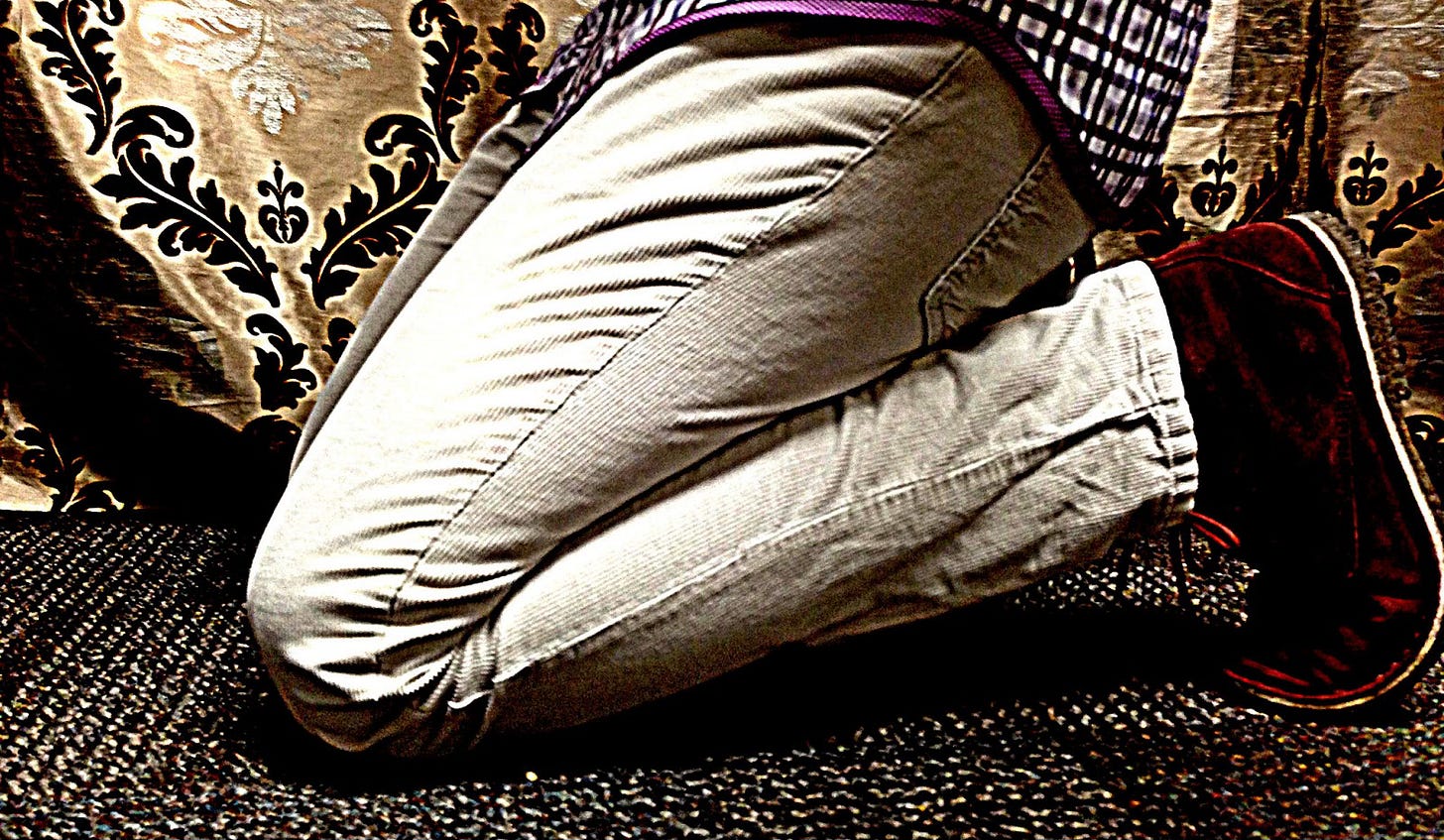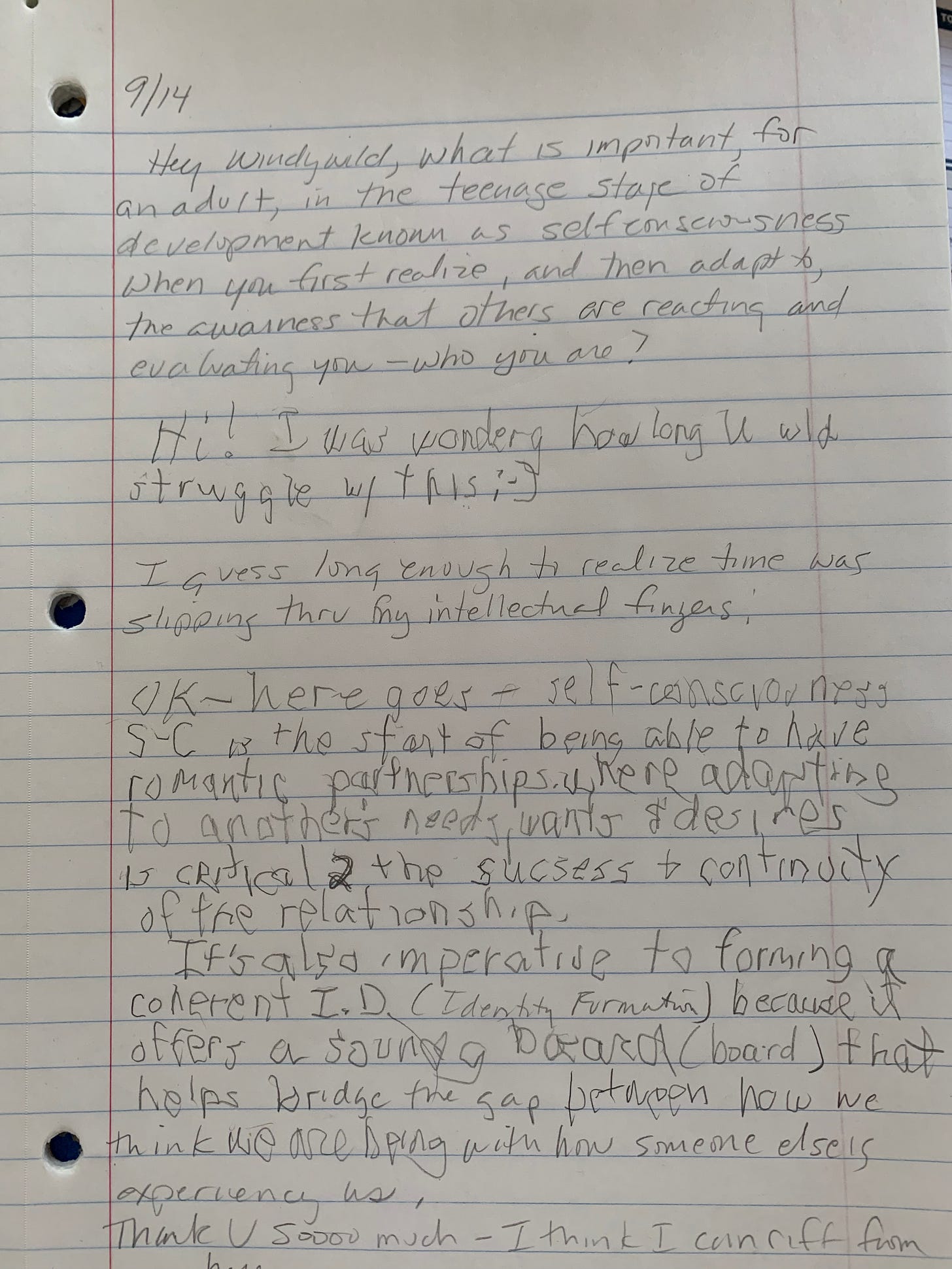Adult Self, Time to Bend the Knee: Part 2
First you were aware of others; now you realize others are aware of you!
Are you a first-time reader?
These posts make the most sense when you start here.
Self-Consciousness OR Self-Awareness?
Here, again, when it comes to teenagers, you can see the knee-reflex kicking in the direction of what’s difficult or challenging—the self-consciousness that caused us to feel less than.
We do have another equally, and perhaps more than equally, true choice: the unfolding self-awareness that made each of us a unique, teen, work-of-art in progress.
Self-Consciousness
As a child, your awareness of others was limited to how your behavior elicited reactions.
Sometimes, the reactions of others made you feel bad about yourself, good about yourself, or neutral. Each reaction affected you in a straight forward, if limited (and often erroneous), way: I feel good that I made the other feel good about me. Or, I feel bad that I made the other angry or upset with me.
This good/bad reaction drove deep into our core sense-of-self where we often felt as if we, and not our behavior, was at fault. We were, at our core, either good or bad, depending.
As a child, you had no internal framework—emotionally or neurologically—to think about the possibility that the other was reacting to you out of their own internal reality. You had no internal framework to imagine who you might be that would change how the other reacted to you.
As a child, your undeveloped internal framework for evaluating yourself, or others, meant life was confined to a string of actions and reactions.
Not until your teen brain, fed by a flood of new hormones, begin to develop self-consciousness did you start wriggling out of the chrysalis of childhood.
Overnight, your emerging wings—still sticky with the fluids of metamorphosis—took flight and you realized that OMG! Everyone’s going to see that pimple on my forehead! Gross to the max!
Overnight, you began obsessing over your hair, your clothes, your body, and how you looked to the world around you by how you looked to yourself in the mirror.
Your mirror became judge, jury, and executioner. The other was now as transformed as you were.
Your support inspires me to reach higher,
breathe easier. Your free subscription is splendid.
A Paid Subscription helps support my independent writing
so I can offer you more!Self-Awareness
Here’s the thing: no one bothered to tell you that self-consciousness is the first stepping stone to self-awareness because, like all of our firsts, in the beginning it’s awkward, unfamiliar, uncomfortable, and, positively annoying.
Once you realized that other people were not just reacting to you, but also evaluating you, that opened up an entirely new universe for how you experienced yourself. No longer were you limited to actions and reactions. Even though it was cloaked in self-consciousness, suddenly you had agency.
Now you could begin to integrate what you were experiencing internally (sad, angry, annoyed, ecstatic, pleased, satisfied, etc.) with what was happening externally, and not just with others, but now with yourself.
Why did you spend so much time in your room if not to experience the feelings that you were sometimes enough, sometimes not enough, and sometimes more than enough and each of these were determined not by how others were reacting to you, but how you were experiencing yourself by yourself.
Now, with growing self-awareness by your side, you could begin the roller-coaster process of adapting, changing, embellishing, tossing out, challenging, and creating who you wanted to be—on your terms.
Separating Out Stages of Teen Development: A Slippery Slope
Notice how we have an overlap, so far, between the first three stages of teenage development that deeply affect us as adults: identity formation, which is impacted by self-consciousness, which is the stepping stone of self-awareness, which is seminal to the beginning stages of the creative behavior you will fully manifest (or not) as an adult.
At the risk of causing some of my dear readers’ eyes to glaze over, here’s a quote from my dissertation, Creativity: From The Developmental Perspective Of High School Adolescents.
NOTE:
If academia would have allowed it, I would have substituted teenagers for adolescents. After all, the whole point of the study was to finally add the teen voice to academic, adult posturing. Now, I get to define my own reality. So, I’m changing “adolescent” to “teenage/r” in the following quote. The brackets contain current clarifications I thought helpful.
[Overall] teenage development involves a range of biological, cognitive, and social conditions that are being more or less experienced simultaneously. [We separate the stages for intellectual convenience, not as a statement of lived reality.]
[When you consider] the meta-system level of teenage identity formation, this developmental task might be considered self-creation because the internal dynamics of a teenager are primarily involved with organizing their psychological changes in relation to a creation of their core sense of self.
From this perspective, conscious self-creation—the evolving development of conscious self-awareness—becomes the master task tying together all tasks of teen development that builds your core sense of self as an adult.
And here we have a surfacing glimmer of the relationship between teenage development and creativity that lies at the heart of A Slice of Orange, A Pinch of Sky.
Inner Teen Gift #5: Self-Awareness—the master task and developmental cornerstone for your adult creative behavior, which originates with creating an identity, not just as a teen, but as the specific direction for your future, adult Creative Self.
But Wait, There’s More…
My Inner Teen Wants To Join This Conversation
I knew what I wanted to write about tonight, but early on, I got stuck.
I opened, read, then closed a series of notes. I went downstairs to make a cup of tea. Toyed with the idea of watching television. Scolded myself for wimping out. Sat back down at the computer. Reread my first paragraphs (for the umpteenth time).
Then, I remembered to journal with my non-dominant hand to get some help from Windywild.
So you can see what this looks like, in all of its glorious mess, I’ll upload that page.
But first, since non-dominant handwriting can be hard to read, I’ll type it out for you. Brackets are my clarifications.
Me: Hey Windywild, what is important, for an adult, in the teenage stage of development known as self-consciousness when you first realize, and then adapt to, the awareness that others are reacting and evaluating you—who you are?
Windywild: Hi! I was wonderg how long U wld struggle w/ this :-)
Me: I guess long enough to realize time was slipping thru my intellectual fingers.
Windywild: OK—here goes—self-consciousness S-C is the start of being able to have romantic partnerships where adapting to another’s needs, wants & desires is critical 2 the success & continuity of the relationship.
It’s also imperative to forming a coherent I.D. [identity formation] because it offers a soundg board that helps bridge the gap between how we think we are being with how someone else is experiencing us.
Me: Thank U soooo much – I think I can riff from here.
Now, I might have arrived at these two points about the value of teenage self-consciousness for the Adult Self—1) fundamental to future romantic relationships and 2) helps us pay attention to how someone else is experiencing our behavior when we are not paying attention—but my Substack deadline might have suffered.
Asking my Inner Teen for specific information (about teen development) was a six-minute transaction. She didn’t hesitate. Her response was not only instantaneous, it was spot on.
Your Practical Application:
Here’s an example prompt/question, based on self-awareness, that you can repurpose in your own words to ask your Inner Teen for support when dealing with this area in your adult life.
If you want a refresher course on how to connect with your Inner Teen, this post went into the Inner Family approach step-by-step.
Once you’ve established an ongoing, current relationship with your Inner Teen, they can help you with the nitty gritty of living life. It’s not just free, it’s a testament to working with different aspects of yourself for inner peace and satisfaction.
By employing the Inner Family approach, specifically to connect with your Inner Teen, you can access hidden reserves of deep wisdom.
For Self-Awareness:
If you have recently encountered a situation where you suspect you have a blind spot, ask your Inner Teen for clarification.
Your Prompt:
[Inner Teen’s name], I’m having trouble understanding (fill in the situation). I suspect there is something I’m not getting. What do you think I should know or pay attention to?
And remember, kindness, consideration, and respect go a long way when interacting with any member of Your Internal Family.
What’s Next?
Now that you’ve finished the 11th post, we’ll continue exploring Adult Self, Time to Bend the Knee: Part 3— our 12th post—with the rocky road (think: an encounter with marshmallows and nuts) to self-esteem and self-worth.
Your childhood laid the foundation for your self-worth, but it wasn’t until you were a teen that you could evaluate, advocate, and help shape the specifics of your self-worth.
Another gift from your teenage years where—without the awareness of your self-worth (or lack of)—your adult self would be handicapped.
Your support inspires me to reach higher,
breathe easier. Your free subscription is splendid.
A Paid Subscription helps support my independent writing
so I can offer you more!Have you taken 30 minutes to connect with your Inner Teen yet?
Please, tell me…
1) Are you’re on your way?
2) If yes, how it’s going for you?
3) If you don’t feel ready, but you want to explore, what else would be helpful?
You can hit “reply” (if you get this via email), or comment, if you’re comfortable sharing inside the Substack platform where my community is both kind and caring.
If you have any confounding questions about any of this, I’m absolutely here for you.
Meanwhile, please …
Add a comment to this post because I really, really need to know what’s intriguing you, if there’s anything else you want to know/hear, or if you have a question or a thought. Controversy welcomed!
Tap the heart icon if you’re finding this thought-provoking or just because it lights up my day to know you’re out there and care!
3. Discover why Inspiration changed from a what to a Who.
Come Meet The Goddess of Inspiration and expand your creativity: an original, guided meditation for any time you hit a roadblock or doubts are taking over.
P.S. To continue this series, scroll down and hit “next.”
To reacquaint yourself with My Premise / My Promise, click here.










